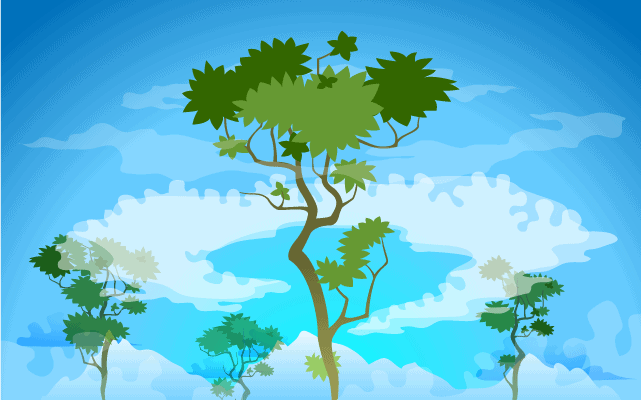Evergreen Content: What It Is and Why You Need It?

If you happen to be a newbie in the world of digital marketing, you might be not familiar with evergreen content quite yet. It is a popular buzzword used in content marketing and referred to as one of the key factors for achieving content strategy success. Whether or not, you are familiar with the evergreen content; it’s crucial to know everything about it. In this article, we will explain to you what is evergreen content, how it can benefit and help to improve your content strategy. By using it on your blog we are sure that you will always hit the bullseye with every piece of content you create.
What is evergreen content?
Evergreen content continues to be relevant to its readers and gives them value years after the publish date. It is always fresh and up-to-date. It remains informative and retains its original quality. As its name implies – it is timeless.
That’s why it’s called “evergreen.” Like pine trees retaining their leaves throughout the year, evergreen content remains valuable to readers. It stands the test of time and never goes out of date.
If you create evergreen content on your blog today, your readers will find it relevant now or years from now when they revisit it. That is what it’s all about. Providing your audience with something that does not expire after a short period, something that never loses its value.
What evergreen content is not
Before you can start writing your evergreen content, you need to understand what kind of content is not considered evergreen.
News articles can never be evergreen because they have an end date and refer to current events. They may have value for someone looking for a particular news report from an earlier period. But it will not provide you with regular website traffic.
Like news articles, content that includes statistical reports will also go out of date. Statistics change over time, as they include numbers relevant to a particular period. Someone may search for particular outdated statistics only for comparative purposes. Such content doesn’t provide regular traffic.
Content focused on current trends in fashion, design, or marketing that is relevant to a particular time is also not evergreen.
Like with current trends, content that focuses on specific seasons or holidays is also not evergreen. For instance, a blog post providing special tips for this summer may be attractive at the moment, but it will not matter several months from now.
But, content related to Christmas or Thanksgiving, may bring you traffic during those holidays, no matter the year. But that doesn’t make that kind of content evergreen, as it is not relevant all year round.
Understanding the difference between content that is evergreen and that is not will help take your content strategy to a whole new level.
The benefits of Evergreen content
You get the idea of what kind of content is evergreen by now, but do you understand why it matters so much? Do you know why evergreen content is valuable? Here are several benefits it can provide you with in the long run.
Higher search engines ranking
Search engines recognize evergreen content and give it more value than old content. Google and other search websites are crawling millions of web pages and analyzing every piece of content. If they found your content valuable and optimized for certain search terms, they will reward you with a higher ranking in search results.
Higher website traffic
Since evergreen content will help you improve your SEO ranking, it goes without saying that you will drive more traffic to your blog. When someone searches for specific keywords and you implemented them into your content search engines will recognize those words. Regardless of the content’s publication date, they will direct people to your blog, increasing your web traffic.
Since your content is evergreen and remains relevant all the time, it will keep bringing traffic to your blog. As opposed to trending topics, which can provide you with a surge in traffic for a short period. Evergreen content will provide a steady amount of traffic long after the publishing date.
Also, evergreen content is more likely to get shared on social media. In the long run, it will help you pull in, even more, traffic over time.
Continual lead generation
When you get higher website traffic, your chances of generating more leads will improve. More leads should bring additional sales and opportunities. Since your content is evergreen, you will get more visitors to your site. It should help you to create a continual lead generating machine.
The key, of course, is to optimize your evergreen content by including compelling CTAs. You need to take full advantage of the opportunity and capture those leads. For instance, if you want to increase your blog subscriber base, evergreen content can help you with that. All you need to do is include enticing call-to-action in the content to compel your blog visitors to subscribe.
Types of evergreen content
Several types of content are considered evergreen. There is a chance that you already have evergreen content on your blog. If not, then you need to create timeless content that will always give value to your readers. Many people get stuck at the starting line when coming up with evergreen content. Make sure you consider the following types of content that will help you craft your piece.
Evergreen content shouldn’t be in the form or text only. It can also be in the form of infographics, images, and videos.
Lists
A list compiled of the most useful and relevant information about an individual topic. It can be of tremendous value to your target audience. Lists are very easy to follow, and they make all the information included very easy to digest. You can create a list of the best services for increasing productivity or a list of the best books covering productivity topics. Such content doesn’t go out of date.
Also, you can always make lists of common mistakes that your target audience should avoid. If you run a photography blog, you can compile a list of the most common mistakes photographers make. Regardless of your niche, you can craft a list of blogging mistakes to avoid, as that kind of content will always bring value to your readers.
Top tips
Providing tips for achieving something is also a recipe for evergreen content. You can create top tips for pretty much anything. Here are a few examples: top tips for creating high-quality content, top blogging tips for increasing productivity, etc. You get the idea.
These kinds of tips will always be relevant to a specific target audience, which is why they are excellent for creating evergreen content.
How-to tutorials
How-to tutorials and guides can also make for excellent evergreen content. The key is to aim them at beginners and explain every single step for solving a particular problem.
This kind of evergreen content is usually longer than an average blog post. You will need to present information in an easy-to-follow fashion. Your target audience needs to understand the topic and be able to put it into practice.
The items could vary. You can create a guide on how to start a blog or a how-to tutorial for building a dog house. The key is to tackle a topic that doesn’t change over time and to provide useful information for helping people do something.
Encyclopaedia entries
Content that focuses on unchanging facts and truths about a particular subject are also suitable for evergreen content. You can create an “everything you need to know” blog post based on a unique topic and include everything there is to know about it.
You can include the historical facts, ultimate tips, and the best practices for reaching a particular goal about the matter in question. The key to creating encyclopedic entries is to provide all the facts about something that will not change in the future.
Examples of evergreen content
By now you should understand what evergreen content is. Here are some examples of evergreen content, so that you can get a clear picture of how this kind of content should look.
- Take for example one of our guides, How to Make a Website. It is a complete beginner’s guide to creating and launching a website. Not only is it aimed at a broad audience of absolute beginners, but it also focuses on a topic that will never go out of date. People will continue to make websites in the future, which makes this kind of content evergreen.
- Another great example of evergreen content is our The Beginner’s Guide to SEO. It provides all the information you need to know about search engine optimization. Includes info on how search engines operate and why search engine marketing is necessary. This guide will continue to be relevant for years to come since it provides value to anyone looking to learn everything about SEO from scratch.
- Articles about top travel destinations will also always be valuable. There is rarely a traveler who doesn’t go online to find some inspiration for the next destination to visit. People will spend hours researching and learning everything about the place before heading for the journey. National Geographic’s article 17 of the World’s Most Romantic Destinations is an excellent example. It provides a list of top romantic destinations that will always be popular. It is not a list of summer destinations or the most affordable destinations for the current year, which is what makes it evergreen.
- Content Marketing Glossary by Copyblogger is yet another incredible example of evergreen content. It provides definitions of every term related to content marketing, along with useful links and videos. Anyone entering the world of content marketing can find this blog post very informative. It contains facts that will neither change over time nor lose their value.
Conclusion
To create evergreen content, you need to make sure that it benefits your target audience for a longer period and that it stays relevant.
For your evergreen content to remain relevant, you should revisit it from time to time and make sure it is up-to-date. A piece of content related to all the information about SEO is evergreen, but some information might need edits after a while. For example, Google rolls out a new ranking algorithm, and you need to add it to the list.
Still, as long as you focus on long-term relevance and value, you will manage to create content that is timeless and powerful. Keep in mind that you don’t have to create only evergreen content for your blog. You need a mix of both timeless and timely content that will help you always keep your readers engaged. So, step up your game with evergreen blog posts, but mix them up with fresh ones and you will breathe new life into your blog.
